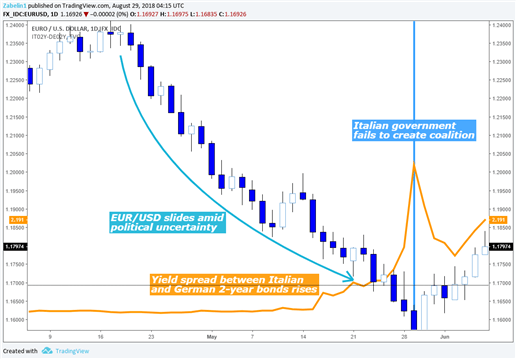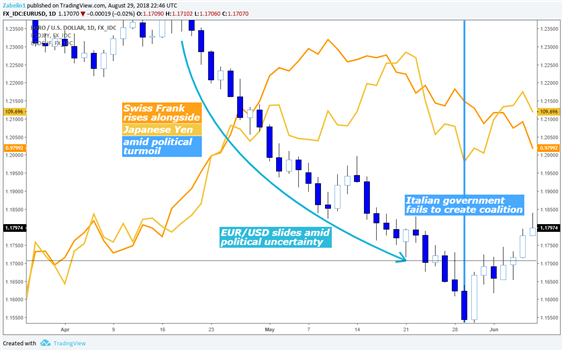Talking Points – EURO, ITALY, EU, EUROZONE
- Italian populism brings economic nationalists to power
- Fiscal agenda and eurosceptic rhetoric worries traders
- What does Italian economic nationalism mean for markets?
What is economic nationalism?
Economic nationalism is an ideology that is often characterized by a general skepticism toward globalization and people outside of a given nation. Parties or movements adhering to this kind of philosophy often instate protectionist trade policies and stricter controls on cross-border immigration.
The rhetoric and policies that are espoused from parties representing economic nationalists are often rooted in a growing concern for the nation’s identity and economic wellbeing. Their claims generally attribute the nation’s economic and cultural deterioration to immigrants that are believed to be both straining the economy and undermining the country’s identity.
The policies that follow this political agenda are focused on the nation and often go against the social, political, and economic trajectory of globalization. The friction from this creates an environment of uncertainty that troubles investors and creates market-wide volatility and aversion to risk-taking.
Economic nationalism in Europe: the case of Italy
The current economic circumstances in Italy are understandably worrying. The debt-to-GDP ratio stands at 130% and youth unemployment is above 30%. As a result, populism and economic nationalism have emerged, driven by a frustrated populace that is facing declining standards of living, low prospects of upward mobility, and high unemployment.
The Parties
The two most popular parties that developed as a response to the frustration of these circumstances are the 5-Star Movement (M5S) and the League. They formed a coalition in 2018 and currently work together in the new Italian “Government of Change” regime led by M5S-backed Prime Minister Giuseppe Conte. While the two parties diverge on certain policy issues, they are both – broadly speaking – populist. Their proposed agendas threaten Italy’s already precarious economy and may undermine its relationship with the EU.
The Nationalist Agenda
Some M5S policies include cutting taxes and lowering the retirement age, while simultaneously providing financial aid for the poor and unemployed. When it comes to European integration, their stance has been ambiguous. In December 2017, M5S leader Luigi di Maio, who currently serves as Deputy Prime Minister, said he would support a Eurozone exit referendum. In February 2018, Di Maio changed his tune and stated that the “European Union is the Five Star Movement’s home”.
The League also has eurosceptic tendencies. Support for its nationalist and anti-immigrant message is building in Italy and strengthening League leader Matteo Salvini’s popularity and political leverage. This may allow him to apply more pressure on EU officials to approve the Italian government’s proposal for greater fiscal spending. Salvini also holds the position of Deputy Prime Minister in the newly formed Italian government.
Despite the League and M5S receiving the most votes in March, neither party had an outright majority. Consequently, no government was formed immediately. This uncertainty worried financial markets and sent the Euro lower as yield spreads between Italian and German 2-year bonds widened, signaling an increase in the former country’s “riskiness” in the eyes of investors.
The crisis hit fever pitch on May 29th when the Italian President Sergio Mattarella rejected a proposed coalition between M5S and the League on the grounds that its proposed finance minister was vocally anti-Euro. Mr Mattarella then promptly moved to establish a technocrat-led administration, rattling markets further as the populists balked. Turmoil abated when a new regime was finally established on June 1st, with Mattarella agreeing to endorse a M5S/League government after a moderating reshuffle of the would-be cabinet.
Chart showing the effect of political uncertainty on the Euro and European bonds

Why does economic nationalism matter for the Euro?
Both the League and M5S have laid out a plan to increase public spending, despite the difficulty of servicing an already high level of debt in an economy with slow growth and high unemployment. This may be seen as increasing the probability of a default on Italian debt that could trigger an existential crisis for the Eurozone.
Italy is the fourth-largest Euro area economy. It seems hardly controversial to say that regional economic activity would be disrupted if it were to default. Perhaps even more worryingly, global markets would surely panic as investors ponder whether a currency union built on a foundation of strict budget rules can credibly survive after one of its founding members goes bust.
Impact on Financial Markets
Capital flight is likely to sink Euro in this scenario. Currencies with close ties to the Eurozone economy like the Swedish Krona as well as the Danish and Norwegian Kroner may follow. Meanwhile, the pro-risk Australian and New Zealand Dollar may suffer amid market-wide risk aversion. On the opposite end of the specturm, anti-risk alternatives like the Japanese Yen, Swiss Franc and the US Dollar may outperform.
Chart showing the effect of political uncertainty on two risk-off currencies: CHF and YEN

The British Pound may also go up in such a crisis as the UK’sgeographical proximity to continental Europeinspire demand for Sterling as a regional alternative to the Euro. The UK unit might appreciate against risk-sensitive currencies such as AUD and NZD but lose ground against JPY, CHF, and USD as the lion’s share of volatility is concentrated at sentiment extremes.
FX TRADING RESOURCES
- Join a free Q&A webinar and have your trading questions answered
- Just getting started? See our beginners’ guide for FX traders
- Having trouble with your strategy? Here’s the #1 mistake that traders make
--- Written by Dimitri Zabelin, Jr Currency Analyst
To contact Dimitri, use the comments section below or @ZabelinDimitri on Twitter





